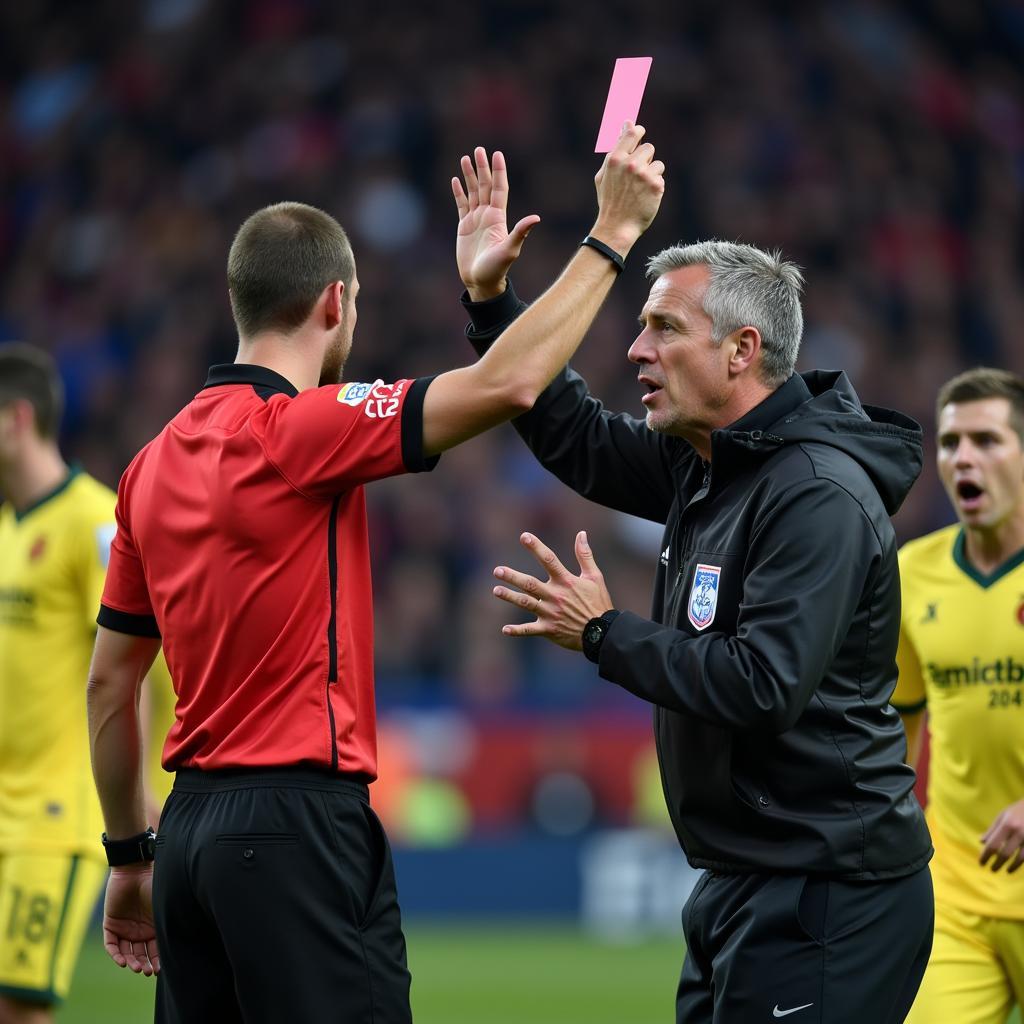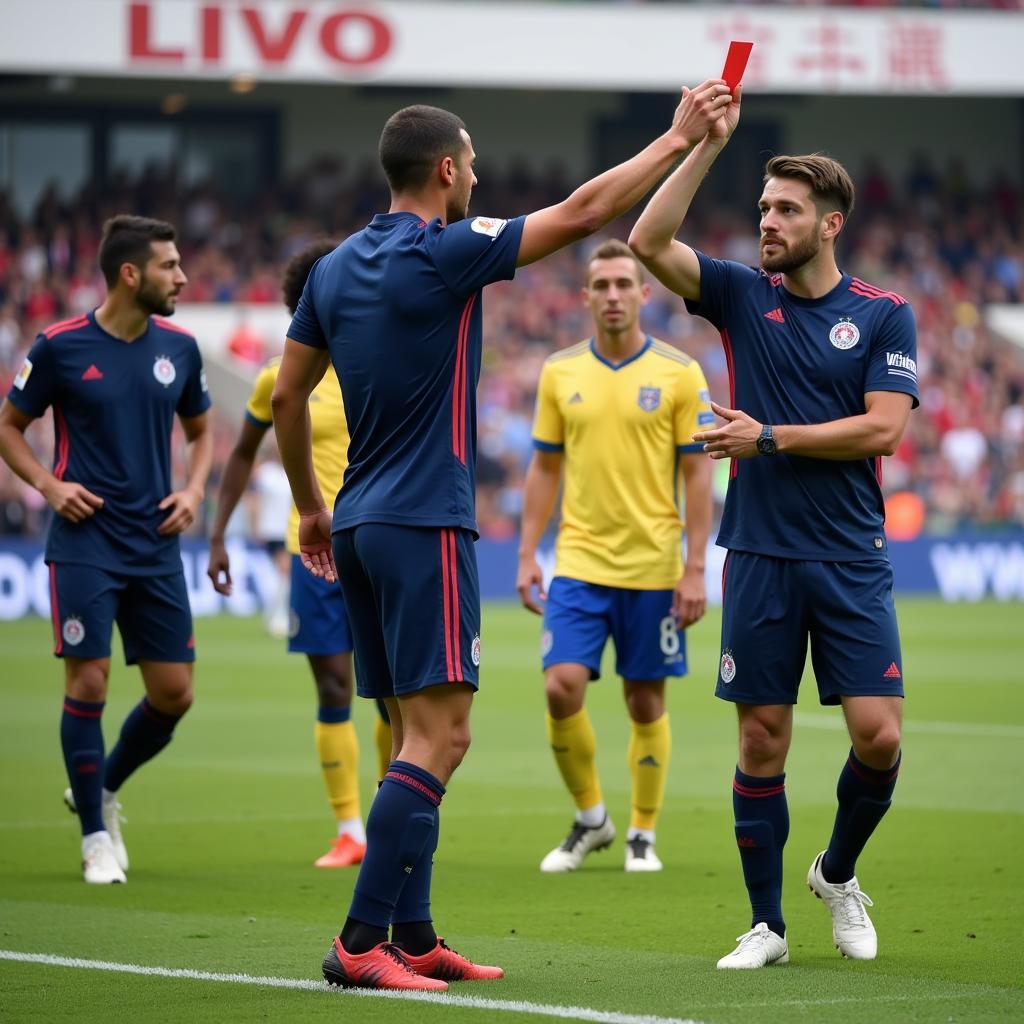What Happens if a Coach Gets a Red Card?
October 30, 2024A coach receiving a red card in football is a fascinating scenario, raising questions about the consequences and impact on the game. Understanding what happens when a coach sees red is crucial for players, fans, and anyone interested in the intricacies of the beautiful game.
The Repercussions of a Coach Red Card
A red card for a coach doesn’t mean they’re physically sent off the field like a player. Instead, it results in their expulsion from the technical area and often, depending on the governing body and specific competition rules, they are required to leave the immediate vicinity of the field, often heading to the stands or a designated area away from the team bench. This separation prevents the coach from directly communicating with their team during the remainder of the match. The impact on the team’s strategy and morale can be significant.
Impact on Team Communication and Strategy
One of the most immediate consequences is the disruption to team communication. With the coach gone, assistant coaches or other designated staff must take over, sometimes leading to confusion or a change in tactical approach. The coach’s absence can also affect player morale, particularly if they rely heavily on their coach’s guidance.
- Disruption of pre-planned strategies
- Difficulty in making real-time tactical adjustments
- Potential for miscommunication and confusion among players
- Impact on player morale and motivation
Furthermore, a coach’s red card can create uncertainty about future matches. Depending on the severity of the offense and the rules of the competition, the coach may face further sanctions, including suspensions from subsequent games or fines.
Different Rules Across Competitions
It’s worth noting that the rules regarding coach red cards can vary across different leagues and competitions. While the general principle of removal from the technical area remains consistent, the specific details of where they must go, and any subsequent sanctions can differ. For instance, in some competitions, the coach may be allowed to communicate with the team through an intermediary, while in others, all communication is strictly prohibited.
Why Coaches Get Red Cards
Coaches can be shown a red card for a variety of reasons, mostly related to misconduct. These reasons often mirror the offenses that would earn a player a red card, but they can also include specific actions related to a coach’s role.
- Using abusive or insulting language towards match officials, opposing team staff, or even their own players.
- Persistent dissent or arguing with the referee’s decisions.
- Entering the field of play without permission.
- Violent conduct, although rare, can also result in a red card.
- Deliberately delaying the restart of play.
 Coach Arguing with Referee Leading to a Red Card
Coach Arguing with Referee Leading to a Red Card
“A coach’s red card can be a turning point in a match. The disruption to communication and strategy can have a significant impact, sometimes leading to a shift in momentum,” says John Smith, former Premier League coach.
Dealing with the Aftermath of a Coach Red Card
The team’s response to a coach’s red card is crucial. The assistant coach or other designated staff member must step up and take charge, maintaining composure and ensuring clear communication with the players. This can include reaffirming the game plan, adjusting tactics as needed, and providing motivational support.
Focusing on the Game
Despite the disruption, the players must remain focused on the game. Maintaining discipline and executing their roles is essential to mitigate the negative impact of the coach’s absence.
“The key is to stay focused and not let the coach’s red card become a distraction,” advises Maria Garcia, renowned sports psychologist. “Players need to maintain their composure, stick to the game plan, and trust in their teammates and the remaining coaching staff.”
 Assistant Coach Taking Charge After Red Card Incident
Assistant Coach Taking Charge After Red Card Incident
Conclusion
What Happens If A Coach Gets A Red Card? The answer involves immediate removal from the technical area, potential further sanctions, and a ripple effect on the team’s communication, strategy, and morale. Understanding these consequences underscores the importance of maintaining composure and adhering to the rules of the game, both for coaches and players. The impact of a coach getting a red card can indeed be significant, highlighting the intricate balance of roles within a football team.
FAQ
- What does a red card for a coach mean? It signifies expulsion from the technical area, preventing direct communication with the team.
- Can a coach be physically sent off the field? No, they are usually directed to the stands or a designated area away from the bench.
- Why do coaches get red cards? Misconduct such as abusive language, dissent, or entering the field without permission.
- What happens after a coach gets a red card? An assistant coach takes charge, and the team must adapt to the coach’s absence.
- Do the rules regarding coach red cards vary? Yes, specific details and sanctions can differ across leagues and competitions.
- Can a coach communicate with the team after receiving a red card? This depends on the competition rules, with some allowing communication through an intermediary.
- What is the impact of a coach’s red card on the team? It can disrupt communication, strategy, and potentially affect player morale.
Suggested Questions
- What are the typical sanctions for a coach receiving a red card?
- How do teams prepare for situations where the head coach is absent?
- Are there any famous instances of coach red cards impacting match results?
Contact Us
Need assistance? Contact us 24/7: Phone: 0915117113, Email: [email protected] or visit us at: Tổ 3 Kp Bình An, Phú Thương, Việt Nam, Bình Phước 830000, Việt Nam.